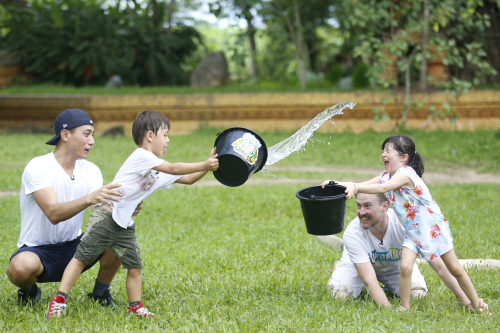 |
|
The group picture of the participants in the reality show Flowers and Youths (FILE) |
If you were a movie star and had a choice—act in a movie for months for 20 million yuan ($3.17 million) or spend half a month shooting a television show with your child for 40 million yuan ($6.35 million)—the answer's pretty much a no-brainer.
Several celebrities are making that very choice. On August 15, the newspaper Chongqing Times revealed a pay list for television stars. Liu Ye, a renowned male film star, can make 4.5 million yuan ($714,000) per day by participating in a show called Dad, Where Are We Going?
This TV program is a gathering of five fathers—three actors, a gold medal boxer and an active TV host—and their children. They are taken to six unfamiliar places in China and show the audience how they spend time together in the new places. In each new place, they live for about two or three days, and the whole shooting process is about 15 days.
Insider's view
Dad is in its third season—the show aired for the first time in China in 2013. Originally created by South Korean MBC Television Stage, this show was localized in China by Hunan Satellite Television, and in its first season, it became the most popular show of 2013, gaining high ratings.
By the end of 2013, the program had made a spin-off film, the shooting of which only took five days. The film became a hit as well and winner at the box office, grossing 700 million yuan ($111.1 million) in total.
"The celebrities showed a side that we rarely see," said Yang Bing, a Beijing-based fan of the show. "It made me feel that they're a lot like us."
The fathers show candor in the show. They chat while cooking together in the kitchen late at night, confessing about not spending more time with the kids due to busy work and expressing love to their spouses.
"But it is still a show," said Lu Tingting, a 30-year-old lawyer in Beijing. "With all the cameras on you, of course you will show the nice part of you. It was different with The Truman Show. Truman didn't know he was in a show, but these fathers know clearly."
Lu refers to the 1998 movie starring Jim Carrey and Ed Harris, in which nearly all of Carrey's character's life is filmed without his knowledge.
Lu used to be a fan of Dad in 2013, but she gave up watching after 2014. "It was getting boring and more commercial."
For Lu, this program is a cut-and-dry model—five fathers and five kids travel to remote places, cook and play together. In the end, they make some touching remarks.
"This is not fresh to me, and I don't think staying with the kids for such little time can mean that much to them," said Lu.
The declining of the audiences' interest has also affected similar shows. Voice of China, the juggernaut in the boom of the reality shows in China, is also losing its audience.
First aired in 2012, the Voice of China, the Chinese version of The Voice of Holland, made a huge hit nationwide with its fresh way of discovering potential singers—the judges sit with their back to the stage and can only evaluate the competitors by their voices.
These judges build teams from the contestants that they choose and compete with each other until one winner is left. When the judges find a very good singer, they will argue to place that person on their respective teams.
The final competition of the show was a live broadcast, attracting about 100 million viewers, breaking the record for Chinese reality shows.
Seeing the potential of such programs, since 2012, many TV stations jumped on the bandwagon, and the competition scope expanded from singing to dancing, comedy performance and many other areas.
"The styles are quite similar. There are normally four or five judges, mostly celebrities. Even the words they use to argue are not that different every year," said Xiao Peng, a college student from Beijing Normal University. "I was crazy for this show in 2012 but got tired in 2013, and last year I didn't watch it at all."
In 2013, Xiao saw a post on Weibo, a microblogging platform in China, that revealed the final winner of the show. "At that time, the final had not even begun," said Xiao, "but finally it was proved true. The winner was probably set before the whole competition. I suspect the whole thing, including the judges' reactions, is a prepared show itself."
"Of course it's prepared," posted Wang Sicong, the son of China's richest man Wang Jianlin, who is very active on social media platforms, on his Weibo. "Don't tell me you guys don't know it."
 |
|
Two fathers and their kids play in the show Dad, Where Are We Going? (FILE) |
Show on the road
If the Dad and singing shows bore their viewers, the producers always have new ideas.
Hurry Up, Brothers, the Chinese version of the program Running Man of South Korea, was a new hit in 2014. Six actors and three actresses are divided into three teams, and they run to a destination while accomplishing set tasks along the way.
Netizens commented that it is funny to see the pretty actresses run crazily, eat noodles fast, argue and even fight to achieve their goal.
Flowers and Youths is a program in which actors travel abroad together and deal with different situations every day. The cameras are set up in their living room all the time.
If group shows are too chaotic for viewers, there are shows that focus on a single individual. In a show called Chef Nic that began in 2014, Nicholas Tse, a 35-year-old actor from Hong Kong, cooks different dishes for different groups of friends.
"It seems that each year, there is a new type of reality show, but it soon loses favor, and the audience will switch to another one," said Lu Yi, a professor with Peking University's School of Journalism and Communication. "It is like fast food."
In contrast to the declining interest of the audiences, stars are making more than ever doing reality television.
Fan Bingbing, according to Chongqing Times, charges 60,000 yuan ($9,524) per minute for her appearances in such shows—with good reason, as Fan is one of the highest paid actresses in the world. In the newly released Forbes' list of the world's highest paid actresses of 2015, Fan ranked fourth with a total paycheck worth $21 million, more than that of Julia Roberts and Angelina Jolie.
There are reasons for the price rise. "Only with these stars can the program get more advertisement, which is crucial," said Zhang Qinglong, who has been involved in producing some reality shows.
Last year, China has localized the American show The Amazing Race, which was originally a program for average Joes. But considering the profit and audience rating, they finally switched to star contestants.
With the explosive booming of such shows, on July 22, the State Administration of Press, Publication, Film and Television of China issued a notice on the strengthening of the reality show management.
On August 25, the administration once again held a reality show training class. Tian Jin, Deputy Director of the administration, reiterated that reality shows should absorb more from all walks of life grassroots participation.
The negative reports of such shows have been accumulated before this. People in the show are suspected to act instead of show—well, reality.
Liu Shuang, known as the name Liu Jishou online with 10 million followers on Weibo, revealed in a Weibo post that a program invited him to join in such a reality show.
"They gave me a script, detailing what to say in every episode, whom I should argue with and what image I should set up in this show," wrote Liu in the post. "They told me the reality shows now are very welcomed among the celebrities, as they are a very good way to set up or renew a public image. If your previous image is not an easygoing person, they will make you look easygoing. If you look isolated and super cool, they make you cook in the kitchen to show your warm side."
"No matter what he says in the post is real or made up, it uncovers the tricks in the shows," said Zhang Dazhi (pseudonym), an assistant director for a reality show. "We need to know the personalities of the participants and create the situation according to that."
In March, when the second season of Flowers and Youths first aired, a picture looking like a script page for the show was posted online, showing many detailed arrangements in the show. Even though the producer said it was actually written after the shooting for the final editing, netizens are wary of how true the reality show can be.
"It doesn't matter anyway," said Song Xi, a drama scriptwriter from Beijing. "The reality show is now in an overheated situation, and people are rushing in to get in on the action. I think after it cools down a little bit, we can have some shows created domestically, and people will have more time and patience to make them better. Or, they will just get tired of this form and go for new entertainment programs."
Copyedited by Kylee McIntyre
